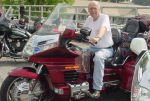Cowboys With Chrome Horses - A Book Review
This article is a review of a motorcycle book called Cowboys With Chrome Horses, written by William G. (Lad) Carrington. This motorcycle history book is available through Jarrett Press & Publications.
Motorcycling in the USA is over a hundred years old. Indeed, one manufacturer, Harley-Davidson, has been making and selling motorcycles continuously for nearly that long. Even though other forms of transportation have surpassed the motorcycle in utility, the motorcycle still sells well and millions of riders are passionate about their machines and the riding experience itself. Why did motorcycling catch on and what sustained it?
This book presents the historian's approach to motorcycling. The author, William Carrington, is an historian as well as a seasoned rider himself having put over 115,000 miles on his 1988 Harley-Davidson FXR. He gives the reader a good, well referenced, history lesson of the building of America using excerpts from 49 reference books. He then intertwines the development of motorcycling into this narrative. The result makes for some interesting reading.
The early settlers of America were often criminals given the choice of the death penalty or deportation to America. Guess what they chose. Others came because they were second or third sons, not in line to receive inheritances that went to first sons. Some came because of religious persecution. Others were looking for work. The earliest settlers arrived here thinking they would find spices to retard spoilage of food back home. Basically they were risk takers and full of individualism.
The cowboys in the 1800s dressed plainly, carried guns and rode horses. Many were American Indians, Mexicans, and blacks, even a few women. Some got bad reputations. Some of the wilder characters became gunfighters, outlaws, lawmen, and bounty hunters.
There was a spirit of individualism and freedom as America developed. The cowboys symbolized this spirit. Then things started to come together and as more and more laws were set in place, society became more rigid and sameness became more and more the norm. People who deviated from the norm were looked upon with suspicion. As the horse gave way to the motorcycle, the newly created motorcyclists inherited the same individualism exhibited by the cowboys. Motorcycles became chrome horses in the evolving society.
Chapters in the book include: Your Typical Biker; America's Image - Cowboy Myth And Reality; Before There Was America; The Spirit of the American Motorcyclist; Ladies of the Road; The Machines; The Long Riders; Clubs, Organizations, And Angels With Wings; The Great Events; The Power Brokers; Motorclothes And The Aftermarket; and the European Invasion.
Carrington gives some great biographical sketches of company founders, historical figures and a few motorcyclists who made history. Don't miss the sketches of Soichiro Honda (not an American but one with the American spirit); Jeremiah Gerbracht, a hearing impaired rider who fought the LAPD over his right to carry his signal dog on his motorcycle, and won; Mike Corbin who built an empire from a simple shaped saddle; S & S Cycles that built an aftermarket empire; and various other American manufacturers including Confederate, Titan, Polaris Victory, and California Motorcycle Company.
There is also a good description of the founding of the American Motorcyclist Association (AMA) and the Harley Owners Group (HOG).
Here's an excerpt about Motorcycle Clubs from the book:
"Motorcycle clubs, like motorcycle events, provide a place for like minded individuals to be together, and not forfeit the American spirit of individualism. We are all different yet together in that individuality. We are aware of ourselves, and our entity as a collective. It is a pledge of unity without relinquishment of freedom."
The modern era of biker discrimination began at a biker rally in Hollister, California in 1947. Here's an excerpt from the book on this watershed event:
"Barely two years after the war's end a Gypsy Tour and motorcycle race weekend in a little California town would make history. July 4th weekend in Hollister, California, would forever stigmatize the bikers in the minds of the American mass consciousness. A confrontation which took place between motorcyclists and local authorities, blown out of proportion by the press, gave precedent or at least proved two significant things. One, that bikers made good fodder for headlines and that the public was easily frightened into enough curiosity to devour the accompanying media hype, with the same feeding frenzy that had previously made dime novels about cowboys a hit. Second, this would also prove to be a major area for political manipulation and an excuse for designating funds and manpower to control these loose Cannons on two wheels."
Here's an excerpt on personal freedom:
"This pastime has today grown to symbolize the last means of total personal freedom left in America, and representative of the concept of individuality maintained in a melting pot society in danger of losing its identity."
Finally, the movies gave us a new perspective on motorcycling. Here's an excerpt from the book:
"As for the movies and the images that they really portray for us, weren't the characters in Easy Rider just good old modern American cowboys, looking for freedom in the open road? After all, when we take to the roads crossing our land, isn't there really just a little bit of Peter, Dennis, or Jack in each of us?"
Carrington's book gives the motorcyclist a fresh historical perspective on how he or she got to this point in time. The book is not a simple read because it is packed with references to other works. Its intertwining of the usual history one reads about in school together with the behind-the-scenes growth of motorcycling is unique and thought provoking.
You will enjoy this book.
More about motorcycle books
More about motorcycle history

|
|
